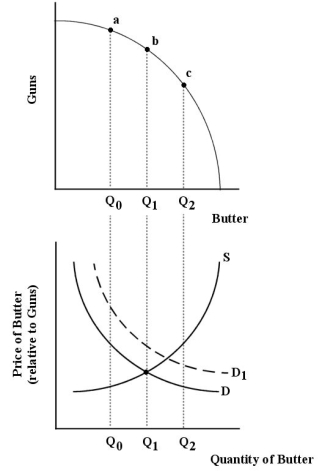The production possibilities boundary shows possible combinations of guns and butter that can be produced by a country.The lower diagram shows demand and supply for butter.  FIGURE 12-2
FIGURE 12-2
-Refer to Figure 12-2.Suppose this economy is allocatively efficient at Q1 units of butter.Now suppose there is an increase in demand for butter from D to D1.After this shift in demand,
A) the supply curve will shift up to S1 and allocative efficiency will be maintained.
B) the marginal value to consumers of butter is less than the marginal cost to producers; the price of butter (relative to the price of guns) rises; the economy moves to output Q2 of butter and point (c) on the PPB.
C) the marginal value to consumers of butter is greater than the marginal cost to producers; the price of butter (relative to the price of guns) rises; the economy moves to output Q2 of butter and point (c) on the PPB.
D) the increase in the price of butter (relative to the price of guns) will cause the demand curve to shift back down to D and allocative efficiency will be maintained.
E) the price of guns (relative to the price of butter) rises and the economy moves to point (a) on the PPB.
Correct Answer:
Verified
Q21: Traditionally,economists have regarded monopoly as an undesirable
Q22: Consider the efficiency of various market structures.In
Q23: An important defence of oligopoly as a
Q24: Consider three firms,A,B and C,all producing kilos
Q25: The production possibilities boundary shows possible combinations
Q27: Monopoly is allocatively inefficient because
A)the price exceeds
Q28: The production possibilities boundary shows possible combinations
Q29: Consider three firms,A,B and C,all producing kilos
Q30: Consider the efficiency of various market structures
Q31: If a perfectly competitive industry was suddenly
Unlock this Answer For Free Now!
View this answer and more for free by performing one of the following actions

Scan the QR code to install the App and get 2 free unlocks

Unlock quizzes for free by uploading documents